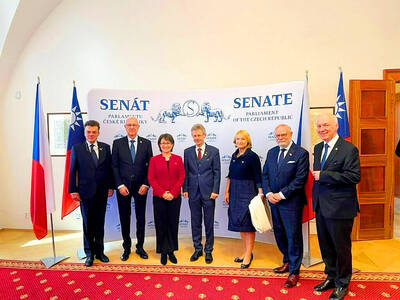A year after its historic vote, Britain yesterday finally opened negotiations with the other 27 EU nations about leaving the bloc, with the final outcome, due in 2019, as globally important as it now seems unpredictable.
The two chief negotiators, Michel Barnier of the EU and David Davis of Britain, immediately set off to find common ground in their working relationship, an important touchstone to see how amicable the biggest political divorce in decades will become.
“Our objective is clear. We must first tackle the uncertainties caused by Brexit,” centering on citizens living in each other’s territory, border arrangements between Ireland and the UK, and the amount that Britain stands to pay to get out of its previous EU commitments, Barnier said.
Davis said he was looking for a “positive and constructive tone” to deal with the myriad issues dividing both sides.
While the EU negotiating team led by Barnier has been ready for months, British efforts on Brexit stalled even after it triggered the two-year process on March 29. An early election this month, in which British Prime Minister Theresa May lost her Conservative majority in parliament, only added to the problems.
“Our big problem is that we have no picture, no idea at all, what the British want,” said Manfred Weber, the head of the European People’s Party Christian Democrat group in the European Parliament.
The other EU countries have a united position, but the British are “in chaos,” Weber added.
May’s government said it was “confident it can achieve a bold and ambitious deal that will work in the interest of the whole UK.”
The EU said it was also looking for a good compromise.
Davis and Barnier have one key issue over the first weeks of talks: building trust after months of haggling over leaks and figures over the final bill that Britain would have to pay for leaving.
After Britain’s referendum to leave the bloc last year, the other 27 nations wanted to start the exit talks as soon as possible so they could work on their own futures, but Britain long seemed dazed by its own momentous move.

FREEDOM OF NAVIGATION: The UK would continue to reinforce ties with Taiwan ‘in a wide range of areas’ as a part of a ‘strong unofficial relationship,’ a paper said The UK plans to conduct more freedom of navigation operations in the Taiwan Strait and the South China Sea, British Secretary of State for Foreign, Commonwealth and Development Affairs David Lammy told the British House of Commons on Tuesday. British Member of Parliament Desmond Swayne said that the Royal Navy’s HMS Spey had passed through the Taiwan Strait “in pursuit of vital international freedom of navigation in the South China Sea.” Swayne asked Lammy whether he agreed that it was “proper and lawful” to do so, and if the UK would continue to carry out similar operations. Lammy replied “yes” to both questions. The

Two US House of Representatives committees yesterday condemned China’s attempt to orchestrate a crash involving Vice President Hsiao Bi-khim’s (蕭美琴) car when she visited the Czech Republic last year as vice president-elect. Czech local media in March last year reported that a Chinese diplomat had run a red light while following Hsiao’s car from the airport, and Czech intelligence last week told local media that Chinese diplomats and agents had also planned to stage a demonstrative car collision. Hsiao on Saturday shared a Reuters news report on the incident through her account on social media platform X and wrote: “I

SHIFT PRIORITIES: The US should first help Taiwan respond to actions China is already taking, instead of focusing too heavily on deterring a large-scale invasion, an expert said US Air Force leaders on Thursday voiced concerns about the Chinese People’s Liberation Army’s (PLA) missile capabilities and its development of a “kill web,” and said that the US Department of Defense’s budget request for next year prioritizes bolstering defenses in the Indo-Pacific region due to the increasing threat posed by China. US experts said that a full-scale Chinese invasion of Taiwan is risky and unlikely, with Beijing more likely to pursue coercive tactics such as political warfare or blockades to achieve its goals. Senior air force and US Space Force leaders, including US Secretary of the Air Force Troy Meink and

Czech officials have confirmed that Chinese agents surveilled Vice President Hsiao Bi-khim (蕭美琴) during her visit to Prague in March 2024 and planned a collision with her car as part of an “unprecedented” provocation by Beijing in Europe. Czech Military Intelligence learned that their Chinese counterparts attempted to create conditions to carry out a demonstrative incident involving Hsiao, which “did not go beyond the preparation stage,” agency director Petr Bartovsky told Czech Radio in a report yesterday. In addition, a Chinese diplomat ran a red light to maintain surveillance of the Taiwanese